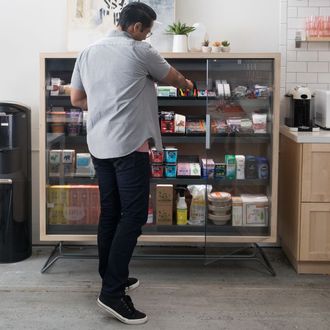
The bodega — known outside of New York City as the corner store — is one of the best things about living in a city, an urban oasis for replenishing your fill of human interaction, odd snacks, beer, and cats. It has been, for all intents and purposes, perfected. So somebody please tell Silicon Valley to stay the hell away.
Paul McDonald and Ashwath Rajan are two ex-Googlers who, according to a profile from Fast Company, are trying to break into the bodega industry. Their start-up, named Bodega, has installed over 50 “five-foot-wide pantry boxes filled with non-perishable items you might pick up at a convenience store,” which operate using an app that charges your credit card if you remove something from the box. (A Bodega employee refills the boxes as items are purchased.) If this sounds like a vending machine, well … it is. Only, it also has AI: “The idea is to preempt what people might need, then use machine learning to constantly reassess the 100 most-needed items in that community.”
Yet this fancy vending-machine company is being pitched as a great disrupting force coming after the world’s bodegas. The problem, I’m assuming, is that it’s hard to pitch “We’re going to disrupt vending machines” to a bunch of venture capitalists. It’s much easier to pitch “We’re going to bring the shining disruptive light of technology to the backward and analog corner store.” And, lo: Bodega is funded by several major investors, including “senior executives at Facebook, Twitter, Dropbox, and Google.”
The founders seem to have missed that while rich investors love to hear about the opportunities for “disrupting” urban institutions, the people who actually use them don’t, so much. (Search “bodega” on Twitter if you don’t believe me.) McDonald and Rajan claim to have done some outreach, but it rings a bit hollow: “We did surveys in the Latin American community to understand if they felt the name was a misappropriation of that term or had negative connotations, and 97% said ‘no,’” McDonald said. Which, sure, on an etymological level, a small box that sells sundries might not technically be a misappropriation of the term bodega. But that interpretation ignores a whole lot of cultural nuance. (Speaking of cultural nuance: The start-up’s logo is … a cat.)
What’s so weird about it, though, is that they didn’t need to face this problem: They’re running a vending-machine start-up, not a corner-store start-up. No vending machine has ever told you to “feel better” after selling you a blue Gatorade for your hangover, and nobody is about to get up in arms to defend the vending-machine industry.
Calling your company Bodega is just inviting criticism. (At least have the decency to remove a couple vowels like a real start-up!) It’s also revealing, in the way it shows off Silicon Valley’s worst tendencies to attack existing businesses with a glibness that belies the actual harm its cash-flush dreams of disruption can do to real humans. More to the point, if you’re not smart enough to realize how tone-deaf it is to go after the real bodegas that anchor cities, I’m not sure you’ll be smart enough to make vending machines I’ll want to use.
Bodega plans to have 1,000 locations across the country by 2018. “Eventually, centralized shopping locations won’t be necessary, because there will be 100,000 Bodegas spread out, with one always 100 feet away from you,” McDonald told Fast Company. Eh: For now, I’ll stick with my corner store, and Bodega can stay away.





























